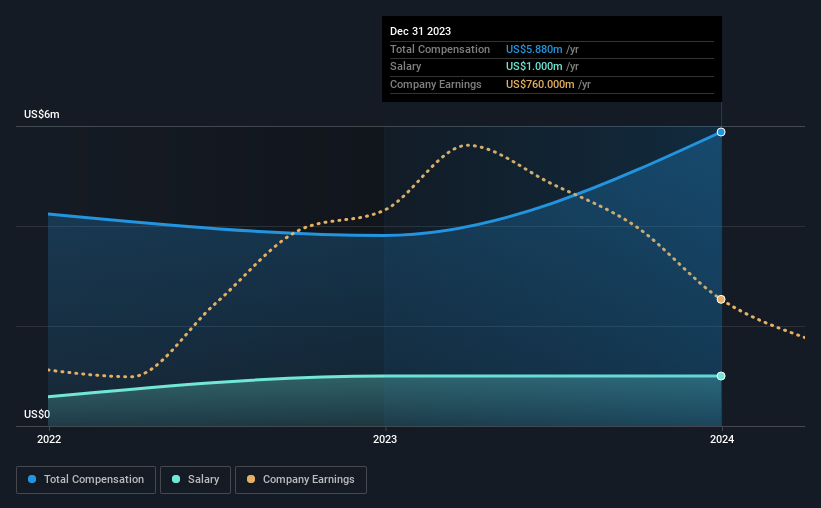We Take A Look At Why Peabody Energy Corporation's (NYSE:BTU) CEO Compensation Is Well Earned
Key Insights
Peabody Energy's Annual General Meeting to take place on 9th of May
Total pay for CEO Jim Grech includes US$1.00m salary
The overall pay is comparable to the industry average
Peabody Energy's total shareholder return over the past three years was 373% while its EPS grew by 82% over the past three years
The performance at Peabody Energy Corporation (NYSE:BTU) has been quite strong recently and CEO Jim Grech has played a role in it. The pleasing results would be something shareholders would keep in mind at the upcoming AGM on 9th of May. This would also be a chance for them to hear the board review the financial results, discuss future company strategy and vote on any resolutions such as executive remuneration. Here is our take on why we think CEO compensation is not extravagant.
See our latest analysis for Peabody Energy
Comparing Peabody Energy Corporation's CEO Compensation With The Industry
According to our data, Peabody Energy Corporation has a market capitalization of US$2.7b, and paid its CEO total annual compensation worth US$5.9m over the year to December 2023. Notably, that's an increase of 54% over the year before. We think total compensation is more important but our data shows that the CEO salary is lower, at US$1.0m.
On comparing similar companies from the American Oil and Gas industry with market caps ranging from US$2.0b to US$6.4b, we found that the median CEO total compensation was US$6.2m. This suggests that Peabody Energy remunerates its CEO largely in line with the industry average. Furthermore, Jim Grech directly owns US$3.6m worth of shares in the company, implying that they are deeply invested in the company's success.
Component | 2023 | 2022 | Proportion (2023) |
Salary | US$1.0m | US$1.0m | 17% |
Other | US$4.9m | US$2.8m | 83% |
Total Compensation | US$5.9m | US$3.8m | 100% |
On an industry level, roughly 13% of total compensation represents salary and 87% is other remuneration. Peabody Energy is paying a higher share of its remuneration through a salary in comparison to the overall industry. If non-salary compensation dominates total pay, it's an indicator that the executive's salary is tied to company performance.
A Look at Peabody Energy Corporation's Growth Numbers
Over the past three years, Peabody Energy Corporation has seen its earnings per share (EPS) grow by 82% per year. Its revenue is down 19% over the previous year.
Overall this is a positive result for shareholders, showing that the company has improved in recent years. The lack of revenue growth isn't ideal, but it is the bottom line that counts most in business. Looking ahead, you might want to check this free visual report on analyst forecasts for the company's future earnings..
Has Peabody Energy Corporation Been A Good Investment?
We think that the total shareholder return of 373%, over three years, would leave most Peabody Energy Corporation shareholders smiling. So they may not be at all concerned if the CEO were to be paid more than is normal for companies around the same size.
To Conclude...
The company's solid performance might have made most shareholders happy, possibly making CEO remuneration the least of the matters to be discussed in the AGM. Instead, investors might be more interested in discussions that would help manage their longer-term growth expectations such as company business strategies and future growth potential.
CEO compensation is an important area to keep your eyes on, but we've also need to pay attention to other attributes of the company. We did our research and identified 3 warning signs (and 1 which is potentially serious) in Peabody Energy we think you should know about.
Important note: Peabody Energy is an exciting stock, but we understand investors may be looking for an unencumbered balance sheet and blockbuster returns. You might find something better in this list of interesting companies with high ROE and low debt.
Have feedback on this article? Concerned about the content? Get in touch with us directly. Alternatively, email editorial-team (at) simplywallst.com.
This article by Simply Wall St is general in nature. We provide commentary based on historical data and analyst forecasts only using an unbiased methodology and our articles are not intended to be financial advice. It does not constitute a recommendation to buy or sell any stock, and does not take account of your objectives, or your financial situation. We aim to bring you long-term focused analysis driven by fundamental data. Note that our analysis may not factor in the latest price-sensitive company announcements or qualitative material. Simply Wall St has no position in any stocks mentioned.

 Yahoo Finance
Yahoo Finance 
